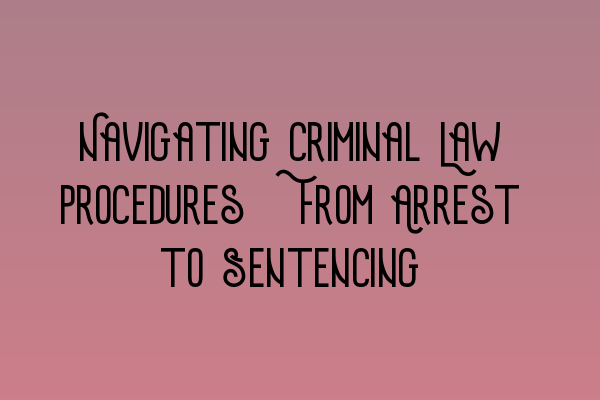Navigating Criminal Law Procedures: From Arrest to Sentencing
When it comes to criminal law, understanding the procedures from the moment of arrest to the final sentencing is crucial. The legal system can be complex and bewildering, but with the right knowledge and guidance, you can navigate through the process smoothly. In this comprehensive guide, we will walk you through each step, providing you with valuable insights and information.
1. Arrest
The first step in a criminal law case is the arrest. Whether you have been arrested or someone you know is in custody, it is essential to familiarize yourself with the rights and procedures involved. Understanding your rights during an arrest is crucial to ensure that you are treated fairly and lawfully.
If you or someone you know has recently been arrested, it is important to seek legal advice as soon as possible. A qualified criminal solicitor can guide you through the next steps and protect your rights throughout the process.
2. Bail
Following an arrest, the next step is often the application for bail. Bail is the temporary release of an accused person awaiting trial. The court will consider various factors, such as the seriousness of the offense and the likelihood of the accused fleeing, before granting or denying bail.
Understanding the bail process and having a skilled solicitor by your side can significantly increase your chances of securing bail. The solicitor will present a strong case for your release and provide supporting evidence to demonstrate that you are not a flight risk.
3. Pre-Trial Procedures
Once bail is granted, the focus shifts to preparing for the trial. This phase involves several pre-trial procedures, including disclosure of evidence, witness interviews, case conferences, and legal research.
During this stage, your solicitor will diligently gather all relevant evidence and assess the strength of the case against you. They will also communicate with the prosecution, negotiate plea bargains if applicable, and advise you on the best legal strategy to adopt.
4. Trial
The trial is the most critical stage in the criminal law process. It is where the prosecution presents their case, and the accused has the opportunity to defend themselves. Trials can take place in either the Magistrates’ Court or the Crown Court, depending on the seriousness of the offense.
Having a skilled criminal solicitor by your side during the trial is essential. They will ensure that your rights are protected, question witnesses, challenge evidence if necessary, and present a strong defense on your behalf.
If you are considering a career in criminal law or preparing for the SQE exams, it is crucial to have a solid understanding of the trial process. Taking SQE 1 practice exam questions and enrolling in SQE 1 preparation courses can greatly enhance your knowledge and confidence in this area.
5. Sentencing
After the trial concludes, the next step is the sentencing. The judge will consider various factors, such as the severity of the offense, the impact on the victim, and any mitigating or aggravating circumstances before determining the appropriate punishment.
If you have been found guilty, it is crucial to have a skilled solicitor advocate on your side during the sentencing phase. They can present compelling arguments in your favor, highlight mitigating factors, and advocate for a fair and proportionate sentence.
Conclusion
Navigating criminal law procedures can be daunting, but with the right guidance and legal support, you can effectively navigate through each step. Understanding your rights, seeking legal advice, and having a skilled solicitor by your side are crucial elements to ensure a fair and just outcome.
If you are interested in pursuing a legal career or preparing for the SQE exams, SQE 2 preparation courses and SQE 1 preparation courses can offer comprehensive guidance and knowledge required for success. Stay updated with the latest SRA SQE exam dates to plan your preparation effectively.
Remember, the legal system is complex, and each case is unique. It is always recommended to consult with a qualified criminal solicitor who can provide personalized advice based on your specific circumstances.
